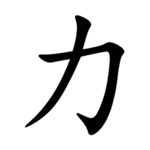Radical 19 (original) (raw)
From Wikipedia, the free encyclopedia
Chinese character radical
"力" redirects here. For the Japanese katakana カ, see Ka (kana).
| 力 | |
|---|---|
| ← 18 Radical 19 (U+2F12) 20 → | |
| 力 (U+529B) "power" | |
| Pronunciations | |
| Pinyin: | lì |
| Bopomofo: | ㄌㄧˋ |
| Wade–Giles: | li4 |
| Cantonese Yale: | lik6 |
| Jyutping: | lik6 |
| Pe̍h-ōe-jī: | la̍t (col.)le̍k (lit.) |
| Japanese Kana: | リョク ryoku / リキ riki (on'yomi)ちから chikara (kun'yomi) |
| Sino-Korean: | 힘 him |
| Names | |
| Chinese name(s): | 力字旁 lìzìpáng |
| Japanese name(s): | 力 chikara |
| Hangul: | 력 (역) ryeok |
| Stroke order animation | |
 |
Radical 19 or radical power (力部) meaning "power" or "force" is one of the 23 Kangxi radicals (214 radicals total) composed of 2 strokes.
In the Kangxi Dictionary, there are 163 characters (out of 49,030) to be found under this radical.
力 is also the 23rd indexing component in the Table of Indexing Chinese Character Components predominantly adopted by Simplified Chinese dictionaries published in mainland China.
| Strokes | Characters |
|---|---|
| +0 | 力 |
| +1 | 劜 |
| +2 | 劝SC (=勸) 办SC (=辦 -> 辛) |
| +3 | 功 加 务SC (=務) 劢SC (=勱) |
| +4 | 劣 劤 劥 劦 劧 动SC (=動) 攰 |
| +5 | 助 努 劫 劬 劭 劮 劯 劰 励SC/JP (=勵) 劲SC (=勁) 劳SC (=勞) 労JP (=勞) |
| +6 | 劵 劶 劷 劸 効JP/variant (=效 -> 攴) 劺 劻 劼 劽 劾 势SC (=勢) |
| +7 | 勀 勁 勂 勃 勄 勅JP/variant (=敕 -> 攴) 勆 勇 勈 勉 勊 勋SC (=勛/勳) 巭KO |
| +8 | 勌 勍 勎 勏 勐 勑 |
| +9 | 勒 勓 勔 動 勖 勗 勘 務 勚SC (=勩) |
| +10 | 勛 勜 勝 勞 |
| +11 | 募 勠 勡 勢 勣 勤 勥 勦 勧JP (=勸) |
| +12 | 勨 勩 勪 勫 勬 勭 |
| +13 | 勮 勯 勰 勱 勲JP (=勳) |
| +14 | 勳 |
| +15 | 勴 勵 勶 |
| +17 | 勷 |
| +18 | 勸 |
The radical is also used as an independent Chinese character. It is one of the Kyōiku kanji or Kanji taught in elementary school in Japan.[1] It is a first grade kanji.[1]
- ^ a b "The Kyoiku Kanji (教育漢字) - Kanshudo". www.kanshudo.com. Archived from the original on March 24, 2022. Retrieved 2023-05-06.
- Fazzioli, Edoardo (1987). Chinese calligraphy : from pictograph to ideogram : the history of 214 essential Chinese/Japanese characters. calligraphy by Rebecca Hon Ko. New York: Abbeville Press. ISBN 0-89659-774-1.
- Leyi Li: “Tracing the Roots of Chinese Characters: 500 Cases”. Beijing 1993, ISBN 978-7-5619-0204-2
- Unihan Database - U+529B


